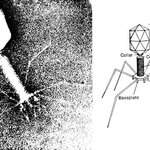
"The placenta is this amazing, complex structure and it's unique to mammals, but we've had no idea what its evolutionary origins are," says Julie Baker, PhD, assistant professor of genetics at Stanford Univeristy and senior author of a study in Genome Research which discusses its evolution.
The placenta is the mother's intricate lifeline to her unborn baby, delivering oxygen and nutrients critical to the baby's health. New evidence suggests the placenta of humans and other mammals evolved from the much simpler tissue that attached to the inside of eggshells and enabled the embryos of our…
